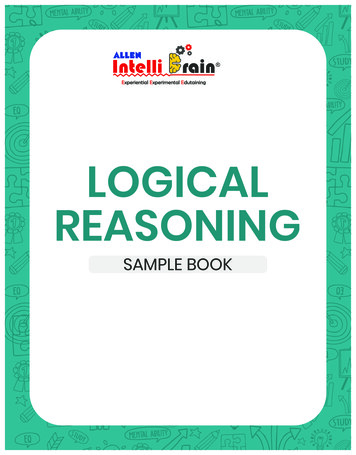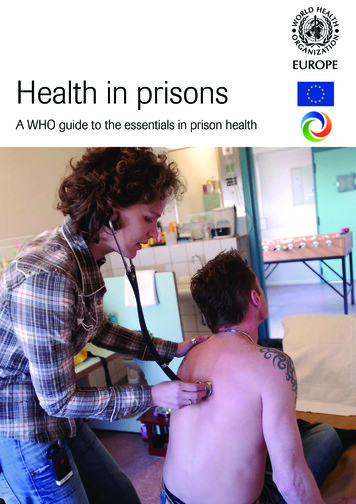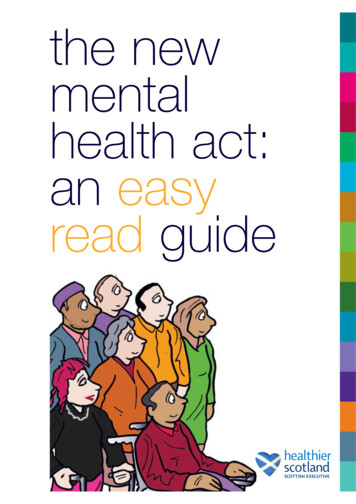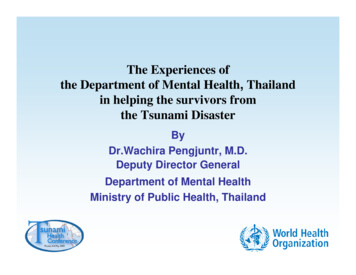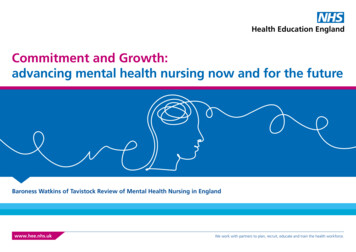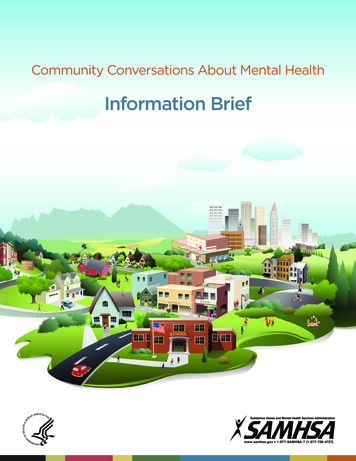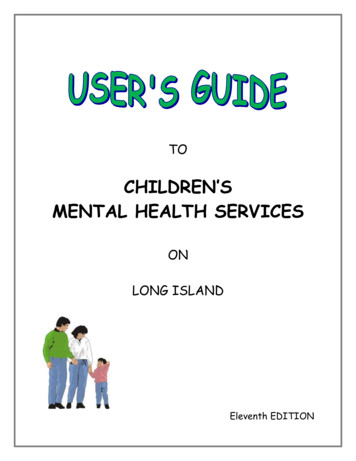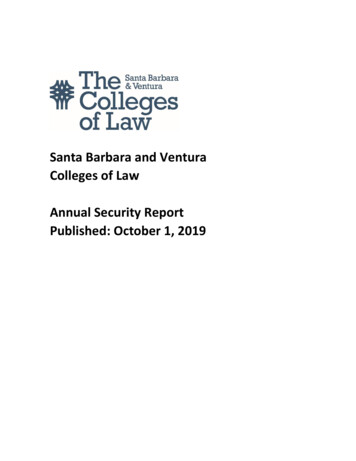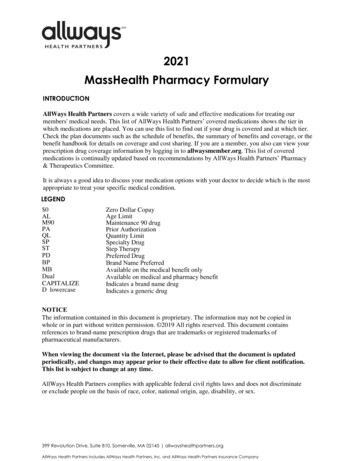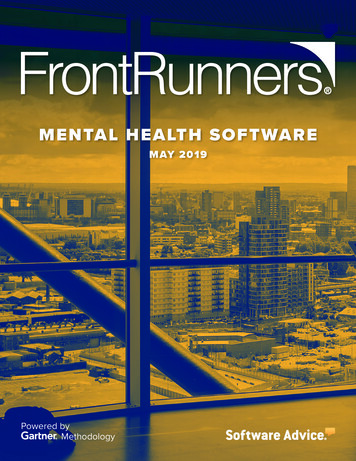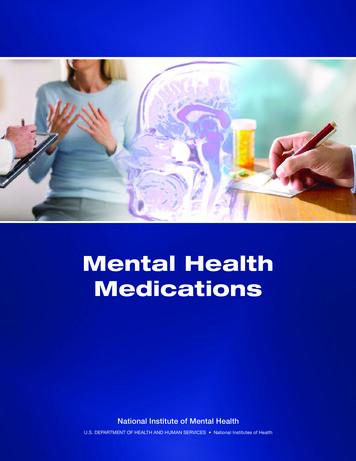
Transcription
Mental HealthMedicationsNational Institute of Mental HealthU.S. DEPARTMENT OF HEALTH AND HUMAN SERVICES UÊÊ Ì Ê ÃÌ ÌÕÌiÃÊ vÊ i Ì
ContentsMental Health Medications . . . . . . . . . . . . . . . . . . . . . . . . . . . . . . . . . . . . . . . . . . . . . . . . . . . . . . . . . . . . . .1What are psychiatric medications? . . . . . . . . . . . . . . . . . . . . . . . . . . . . . . . . . . . . . . . . . . . . . . . . . . . . .1How are medications used to treat mental disorders? . . . . . . . . . . . . . . . . . . . . . . . . . . . . . . . . . . . . . . .1What medications are used to treat schizophrenia? . . . . . . . . . . . . . . . . . . . . . . . . . . . . . . . . . . . . . . . . . . . .2What are the side effects? . . . . . . . . . . . . . . . . . . . . . . . . . . . . . . . . . . . . . . . . . . . . . . . . . . . . . . . . . . . .2How are antipsychotics taken and how do people respond to them? . . . . . . . . . . . . . . . . . . . . . . . . . . .3How do antipsychotics interact with other medications? . . . . . . . . . . . . . . . . . . . . . . . . . . . . . . . . . . . .3What medications are used to treat depression? . . . . . . . . . . . . . . . . . . . . . . . . . . . . . . . . . . . . . . . . . . . . . .4What are the side effects? . . . . . . . . . . . . . . . . . . . . . . . . . . . . . . . . . . . . . . . . . . . . . . . . . . . . . . . . . . . .4How should antidepressants be taken? . . . . . . . . . . . . . . . . . . . . . . . . . . . . . . . . . . . . . . . . . . . . . . . . . .5Are herbal medicines used to treat depression? . . . . . . . . . . . . . . . . . . . . . . . . . . . . . . . . . . . . . . . . . . .5FDA warning on antidepressants. . . . . . . . . . . . . . . . . . . . . . . . . . . . . . . . . . . . . . . . . . . . . . . . . . . . . . .6What medications are used to treat bipolar disorder? . . . . . . . . . . . . . . . . . . . . . . . . . . . . . . . . . . . . . . . . . .7Mood stabilizers . . . . . . . . . . . . . . . . . . . . . . . . . . . . . . . . . . . . . . . . . . . . . . . . . . . . . . . . . . . . . . . . . . .7Atypical antipsychotics . . . . . . . . . . . . . . . . . . . . . . . . . . . . . . . . . . . . . . . . . . . . . . . . . . . . . . . . . . . . . .7Antidepressants . . . . . . . . . . . . . . . . . . . . . . . . . . . . . . . . . . . . . . . . . . . . . . . . . . . . . . . . . . . . . . . . . . . .7What are the side effects? . . . . . . . . . . . . . . . . . . . . . . . . . . . . . . . . . . . . . . . . . . . . . . . . . . . . . . . . . . . .8How should medications for bipolar disorder be taken? . . . . . . . . . . . . . . . . . . . . . . . . . . . . . . . . . . . . .9What medications are used to treat anxiety disorders? . . . . . . . . . . . . . . . . . . . . . . . . . . . . . . . . . . . . . . . .10Antidepressants . . . . . . . . . . . . . . . . . . . . . . . . . . . . . . . . . . . . . . . . . . . . . . . . . . . . . . . . . . . . . . . . . . .10Benzodiazepines (anti-anxiety medications). . . . . . . . . . . . . . . . . . . . . . . . . . . . . . . . . . . . . . . . . . . . .10Beta-blockers. . . . . . . . . . . . . . . . . . . . . . . . . . . . . . . . . . . . . . . . . . . . . . . . . . . . . . . . . . . . . . . . . . . . .10What are the side effects? . . . . . . . . . . . . . . . . . . . . . . . . . . . . . . . . . . . . . . . . . . . . . . . . . . . . . . . . . . .11How should medications for anxiety disorders be taken? . . . . . . . . . . . . . . . . . . . . . . . . . . . . . . . . . . .11What medications are used to treat ADHD? . . . . . . . . . . . . . . . . . . . . . . . . . . . . . . . . . . . . . . . . . . . . . . . .12What are the side effects? . . . . . . . . . . . . . . . . . . . . . . . . . . . . . . . . . . . . . . . . . . . . . . . . . . . . . . . . . . .12How are ADHD medications taken? . . . . . . . . . . . . . . . . . . . . . . . . . . . . . . . . . . . . . . . . . . . . . . . . . . .12Are ADHD medications safe? . . . . . . . . . . . . . . . . . . . . . . . . . . . . . . . . . . . . . . . . . . . . . . . . . . . . . . . .12FDA warning on possible rare side effects . . . . . . . . . . . . . . . . . . . . . . . . . . . . . . . . . . . . . . . . . . . . . .13Which groups have special needs when taking psychiatric medications? . . . . . . . . . . . . . . . . . . . . . . . . . .14Children and adolescents. . . . . . . . . . . . . . . . . . . . . . . . . . . . . . . . . . . . . . . . . . . . . . . . . . . . . . . . . . . .14Older adults . . . . . . . . . . . . . . . . . . . . . . . . . . . . . . . . . . . . . . . . . . . . . . . . . . . . . . . . . . . . . . . . . . . . . .14Women who are pregnant or may become pregnant . . . . . . . . . . . . . . . . . . . . . . . . . . . . . . . . . . . . . . .15What should I ask my doctor if I am prescribed a psychiatric medication? . . . . . . . . . . . . . . . . . . . . . . . .16Alphabetical List of Medications. . . . . . . . . . . . . . . . . . . . . . . . . . . . . . . . . . . . . . . . . . . . . . . . . . . . . . . . .17Citations . . . . . . . . . . . . . . . . . . . . . . . . . . . . . . . . . . . . . . . . . . . . . . . . . . . . . . . . . . . . . . . . . . . . . . . . . . . .25For More Information on Medications . . . . . . . . . . . . . . . . . . . . . . . . . . . . . . . . . . . . . . . . . . . . . . . . . . . .26
Mental Health MedicationsMedications are used to treat thesymptoms of mental disorders suchas schizophrenia, depression, bipolardisorder (sometimes called manic-depressiveillness), anxiety disorders, and attention deficithyperactivity disorder (ADHD). Sometimesmedications are used with other treatments such aspsychotherapy. This guide describes:s Types of medications used to treat mentaldisorderss Side effects of medicationss Directions for taking medicationss Warnings about medications from the U.S.Food and Drug Administration (FDA).This booklet does not provide information aboutdiagnosing mental disorders. Choosing the rightmedication, medication dose, and treatment planshould be based on a person’s individual needs andmedical situation, and under a doctor’s care.Information about medications is frequently updated.Check the FDA Web site (http://www.fda.gov)for the latest information on warnings, patientmedication guides, or newly approved medications.Throughout this document you will see twonames for medications—the generic name andin parenthesis, the trade name. An example isfluoxetine (Prozac). See the end of this documentfor a complete alphabetical listing of medications.What are psychiatricmedications?Psychiatric medications treat mental disorders.Sometimes called psychotropic or psychotherapeutic medications, they have changed the lives ofpeople with mental disorders for the better. ManyMental Health Medicationspeople with mental disorders live fulfilling liveswith the help of these medications. Without them,people with mental disorders might suffer seriousand disabling symptoms.How are medications used totreat mental disorders?Medications treat the symptoms of mentaldisorders. They cannot cure the disorder, but theymake people feel better so they can function.Medications work differently for different people.Some people get great results from medicationsand only need them for a short time. For example,a person with depression may feel much betterafter taking a medication for a few months, andmay never need it again. People with disorders likeschizophrenia or bipolar disorder, or people whohave long-term or severe depression or anxiety mayneed to take medication for a much longer time.Some people get side effects from medicationsand other people don’t. Doses can be small orlarge, depending on the medication and the person.Factors that can affect how medications work inpeople include:s Type of mental disorder, such as depression,anxiety, bipolar disorder, and schizophrenias Age, sex, and body sizes Physical illnessess Habits like smoking and drinkings Liver and kidney functions Geneticss Other medications and herbal/vitaminsupplementss Diets Whether medications are taken as prescribed.1
What medications are used to treat schizophrenia?Antipsychotic medications are used to treatschizophrenia and schizophrenia-relateddisorders. Some of these medications havebeen available since the mid-1950’s. They are alsocalled conventional “typical” antipsychotics. Someof the more commonly used medications include:s Chlorpromazine (Thorazine)s Haloperidol (Haldol)s Perphenazine (generic only)s Fluphenazine (generic only).In the 1990’s, new antipsychotic medicationswere developed. These new medications are calledsecond generation, or “atypical” antipsychotics.One of these medications was clozapine (Clozaril).It is a very effective medication that treatspsychotic symptoms, hallucinations, and breakswith reality, such as when a person believes he orshe is the president. But clozapine can sometimescause a serious problem called agranulocytosis,which is a loss of the white blood cells that help aperson fight infection. Therefore, people who takeclozapine must get their white blood cell countschecked every week or two. This problem and thecost of blood tests make treatment with clozapinedifficult for many people. Still, clozapine ispotentially helpful for people who do not respondto other antipsychotic medications.Other atypical antipsychotics were developed.All of them are effective, and none causeagranulocytosis. These include:s Risperidone (Risperdal)s Olanzapine (Zyprexa)s Quetiapine (Seroquel)2s Ziprasidone (Geodon)s Aripiprazole (Abilify)s Paliperidone (Invega).The antipsychotics listed here are some of themedications used to treat symptoms of schizophrenia. Additional antipsychotics and othermedications used for schizophrenia are listed inthe chart at the end.Note: The FDA issued a Public Health Advisory for atypicalantipsychotic medications. The FDA determined that deathrates are higher for elderly people with dementia whentaking this medication. A review of data has found a risk withconventional antipsychotics as well. Antipsychotic medicationsare not FDA-approved for the treatment of behavioral disordersin patients with dementia.What are the side effects?Some people have side effects when they starttaking these medications. Most side effects goaway after a few days and often can be managedsuccessfully. People who are taking antipsychoticsshould not drive until they adjust to their newmedication. Side effects of many antipsychoticsinclude:s Drowsinesss Dizziness when changing positionss Blurred visions Rapid heartbeats Sensitivity to the suns Skin rashess Menstrual problems for women.Atypical antipsychotic medications can causemajor weight gain and changes in a person’smetabolism. This may increase a person’s risk ofNational Institute of Mental Health
getting diabetes and high cholesterol.1 A person’sweight, glucose levels, and lipid levels should bemonitored regularly by a doctor while taking anatypical antipsychotic medication.a person needs to try several medications beforefinding the right one. Doctors and patients canwork together to find the best medication ormedication combination, and dose.Typical antipsychotic medications can cause sideeffects related to physical movement, such as:s Rigiditys Persistent muscle spasmss Tremorss Restlessness.Some people may have a relapse—their symptomscome back or get worse. Usually, relapses happenwhen people stop taking their medication, or whenthey only take it sometimes. Some people stoptaking the medication because they feel better orthey may feel they don’t need it anymore. Butno one should stop taking an antipsychoticmedication without talking to his or her doctor.When a doctor says it is okay to stop taking amedication, it should be gradually tapered off,never stopped suddenly.Long-term use of typical antipsychotic medicationsmay lead to a condition called tardive dyskinesia(TD). TD causes muscle movements a person can’tcontrol. The movements commonly happen aroundthe mouth. TD can range from mild to severe,and in some people the problem cannot be cured.Sometimes people with TD recover partially orfully after they stop taking the medication.Every year, an estimated 5 percent of people takingtypical antipsychotics get TD. The conditionhappens to fewer people who take the new, atypicalantipsychotics, but some people may still get TD.People who think that they might have TD shouldcheck with their doctor before stopping theirmedication.How are antipsychotics taken andhow do people respond to them?Antipsychotics are usually pills that people swallow,or liquid they can drink. Some antipsychotics areshots that are given once or twice a month.Symptoms of schizophrenia, such as feelingagitated and having hallucinations, usually go awaywithin days. Symptoms like delusions usually goaway within a few weeks. After about six weeks,many people will see a lot of improvement.However, people respond in different ways toantipsychotic medications, and no one can tellbeforehand how a person will respond. SometimesMental Health MedicationsHow do antipsychotics interact withother medications?Antipsychotics can produce unpleasant or dangerousside effects when taken with certain medications.For this reason, all doctors treating a patient needto be aware of all the medications that person istaking. Doctors need to know about prescription andover-the-counter medicine, vitamins, minerals, andherbal supplements. People also need to discuss anyalcohol or other drug use with their doctor.To find out more about how antipsychotics work,the National Institute of Mental Health (NIMH)funded a study called CATIE (Clinical AntipsychoticTrials of Intervention Effectiveness). This studycompared the effectiveness and side effects offive antipsychotics used to treat people withschizophrenia. In general, the study found that theolder medication perphenazine worked as well asthe newer, atypical medications. But because peoplerespond differently to different medications, it isimportant that treatments be designed carefullyfor each person. You can find more information onCATIE here.3
What medications are used to treat depression?Depression is commonly treatedwith antidepressant medications.Antidepressants work to balance someof the natural chemicals in our brains. Thesechemicals are called neurotransmitters, andthey affect our mood and emotional responses.Antidepressants work on neurotransmitters such asserotonin, norepinephrine, and dopamine.The most popular types of antidepressants arecalled selective serotonin reuptake inhibitors(SSRIs). These include:s Fluoxetine (Prozac)s Citalopram (Celexa)s Sertraline (Zoloft)s Paroxetine (Paxil)s Escitalopram (Lexapro).Other types of antidepressants are serotonin andnorepinephrine reuptake inhibitors (SNRIs). SNRIsare similar to SSRIs and include venlafaxine(Effexor) and duloxetine (Cymbalta). Anotherantidepressant that is commonly used is bupropion(Wellbutrin). Bupropion, which works on theneurotransmitter dopamine, is unique in that it doesnot fit into any specific drug type.SSRIs and SNRIs are popular because they donot cause as many side effects as older classes ofantidepressants. Older antidepressant medicationsinclude tricyclics, tetracyclics, and monoamineoxidase inhibitors (MAOIs). For some people,tricyclics, tetracyclics, or MAOIs may be the bestmedications.4What are the side effects?Antidepressants may cause mild side effects thatusually do not last long. Any unusual reactionsor side effects should be reported to a doctorimmediately.The most common side effects associated withSSRIs and SNRIs include:s Headache, which usually goes away within afew days.s Nausea (feeling sick to your stomach), whichusually goes away within a few days.s Sleeplessness or drowsiness, which mayhappen during the first few weeks but thengoes away. Sometimes the medication doseneeds to be reduced or the time of day it istaken needs to be adjusted to help lessenthese side effects.s Agitation (feeling jittery).s Sexual problems, which can affect both menand women and may include reduced sexdrive, and problems having and enjoying sex.Tricyclic antidepressants can cause side effects,including:s Dry mouth.s Constipation.s Bladder problems. It may be hard to emptythe bladder, or the urine stream may not beas strong as usual. Older men with enlargedprostate conditions may be more affected.s Sexual problems, which can affect both menand women and may include reduced sexdrive, and problems having and enjoying sex.National Institute of Mental Health
s Blurred vision, which usually goes awayquickly.s Drowsiness. Usually, antidepressants thatmake you drowsy are taken at bedtime.People taking MAOIs need to be careful aboutthe foods they eat and the medicines they take.Foods and medicines that contain high levels of achemical called tyramine are dangerous for peopletaking MAOIs. Tyramine is found in some cheeses,wines, and pickles. The chemical is also in somemedications, including decongestants and over-thecounter cold medicine.Mixing MAOIs and tyramine can cause a sharpincrease in blood pressure, which can lead tostroke. People taking MAOIs should ask theirdoctors for a complete list of foods, medicines, andother substances to avoid. An MAOI skin patch hasrecently been developed and may help reduce someof these risks. A doctor can help a person figure outif a patch or a pill will work for him or her.How should antidepressants betaken?People taking antidepressants need to follow theirdoctors’ directions. The medication should be takenin the right dose for the right amount of time. It cantake three or four weeks until the medicine takeseffect. Some people take the medications for a shorttime, and some people take them for much longerperiods. People with long-term or severe depressionmay need to take medication for a long time.Once a person is taking antidepressants, it isimportant not to stop taking them without thehelp of a doctor. Sometimes people takingantidepressants feel better and stop taking themedication too soon, and the depression mayreturn. When it is time to stop the medication,the doctor will help the person slowly and safelyMental Health Medicationsdecrease the dose. It’s important to give the bodytime to adjust to the change. People don’t getaddicted, or “hooked,” on the medications, butstopping them abruptly can cause withdrawalsymptoms.If a medication does not work, it is helpful tobe open to trying another one. A study fundedby NIMH found that if a person with difficultto-treat depression did not get better with a firstmedication, chances of getting better increasedwhen the person tried a new one or added a secondmedication to his or her treatment. The study wascalled STAR*D (Sequenced Treatment Alternativesto Relieve Depression).2,3Are herbal medicines used to treatdepression?The herbal medicine St. John’s wort has been usedfor centuries in many folk and herbal remedies.Today in Europe, it is used widely to treat mild-tomoderate depression. In the United States, it is oneof the top-selling botanical products.The National Institutes of Health conducted aclinical trial to determine the effectiveness oftreating adults who have major depression withSt. Johns wort. The study included 340 peoplediagnosed with major depression. One-third ofthe people took the herbal medicine, one-thirdtook an SSRI, and one-third took a placebo, or“sugar pill.” The people did not know what theywere taking. The study found that St. John’s wortwas no more effective than the placebo in treatingmajor depression.4 A study currently in progress islooking at the effectiveness of St. John’s wort fortreating mild or minor depression.Other research has shown that St. John’s wortcan dangerously interact with other medications,including those used to control HIV. On February5
10, 2000, the FDA issued a Public Health Advisoryletter stating that the herb appears to interfere withcertain medications used to treat heart disease,depression, seizures, certain cancers, and organtransplant rejection. Also, St. Johns wort mayinterfere with oral contraceptives.Because St. John’s wort may not mix well withother medications, people should always talkwith their doctors before taking it or any herbalsupplement.FDA warning on antidepressantsAntidepressants are safe and popular, but somestudies have suggested that they may haveunintentional effects, especially in young people.In 2004, the FDA looked at published andunpublished data on trials of antidepressants thatinvolved nearly 4,400 children and adolescents.They found that 4 percent of those takingantidepressants thought about or tried suicide(although no suicides occurred), compared to2 percent of those receiving placebos (sugar pill).In 2005, the FDA decided to adopt a “black box”warning label—the most serious type of warning—on all antidepressant medications. The warningsays there is an increased risk of suicidal thinkingor attempts in children and adolescents takingantidepressants. In 2007, the FDA proposed thatmakers of all antidepressant medications extend thewarning to include young adults up through age 24.6The warning also says that patients of all agestaking antidepressants should be watched closely,especially during the first few weeks of treatment.Possible side effects to look for are depressionthat gets worse, suicidal thinking or behavior,or any unusual changes in behavior such astrouble sleeping, agitation, or withdrawal fromnormal social situations. Families and caregiversshould report any changes to the doctor. Thelatest information from the FDA can be foundat http://www.fda.gov.Results of a comprehensive review of pediatrictrials conducted between 1988 and 2006 suggestedthat the benefits of antidepressant medicationslikely outweigh their risks to children andadolescents with major depression and anxietydisorders.5 The study was funded in part by NIMH.Finally, the FDA has warned that combining thenewer SSRI or SNRI antidepressants with one ofthe commonly-used “triptan” medications usedto treat migraine headaches could cause a lifethreatening illness called “serotonin syndrome.”A person with serotonin syndrome may be agitated,have hallucinations (see or hear things that are notreal), have a high temperature, or have unusualblood pressure changes. Serotonin syndrome isusually associated with the older antidepressantscalled MAOIs, but it can happen with the newerantidepressants as well, if they are mixed with thewrong medications.National Institute of Mental Health
What medications are used to treat bipolar disorder?Bipolar disorder, also called manicdepressive illness, is commonly treatedwith mood stabilizers. Sometimes,antipsychotics and antidepressants are used alongwith a mood stabilizer.Mood stabilizersPeople with bipolar disorder usually try moodstabilizers first. In general, people continuetreatment with mood stabilizers for years. Lithiumis a very effective mood stabilizer. It was the firstmood stabilizer approved by the FDA in the 1970’sfor treating both manic and depressive episodes.Anticonvulsant medications also are used as moodstabilizers. They were originally developed totreat seizures, but they were found to help controlmoods as well. One anticonvulsant commonlyused as a mood stabilizer is valproic acid, alsocalled divalproex sodium (Depakote). For somepeople, it may work better than lithium.6 Otheranticonvulsants used as mood stabilizers arecarbamazepine (Tegretol), lamotrigine (Lamictal)and oxcarbazepine (Trileptal).Atypical antipsychoticsAtypical antipsychotic medications are sometimesused to treat symptoms of bipolar disorder.Often, antipsychotics are used along with othermedications.Mental Health MedicationsAntipsychotics used to treat people with bipolardisorder include:s Olanzapine (Zyprexa), which helps peoplewith severe or psychotic depression, whichoften is accompanied by a break with reality,hallucinations, or delusions7s Aripiprazole (Abilify), which can be taken asa pill or as a shots Risperidone (Risperdal)s Ziprasidone (Geodon)s Clozapine (Clorazil), which is often usedfor people who do not respond to lithium oranticonvulsants.8AntidepressantsAntidepressants are sometimes used to treatsymptoms of depression in bipolar disorder.Fluoxetine (Prozac), paroxetine (Paxil), orsertraline (Zoloft) are a few that are used. However,people with bipolar disorder should not take anantidepressant on its own. Doing so can cause theperson to rapidly switch from depression to mania,which can be dangerous.9 To prevent this problem,doctors give patients a mood stabilizer or anantipsychotic along with an antidepressant.Research on whether antidepressants help peoplewith bipolar depression is mixed. An NIMHfunded study found that antidepressants wereno more effective than a placebo to help treatdepression in people with bipolar disorder. Thepeople were taking mood stabilizers along with7
the antidepressants. You can find out more aboutthis study, called STEP-BD (Systematic TreatmentEnhancement Program for Bipolar Disorder),here.10What are the side effects?Treatments for bipolar disorder have improved overthe last 10 years. But everyone responds differentlyto medications. If you have any side effects, tellyour doctor right away. He or she may change thedose or prescribe a different medication.Different medications for treating bipolar disordermay cause different side effects. Some medicationsused for treating bipolar disorder have beenlinked to unique and serious symptoms, which aredescribed below.Lithium can cause several side effects, and some ofthem may become serious. They include:s Loss of coordinations Excessive thirsts Frequent urinations Blackoutss Seizuress Slurred speechs Fast, slow, irregular, or pounding heartbeats Hallucinations (seeing things or hearingvoices that do not exist)s Changes in visions Itching, rashs Swelling of the eyes, face, lips, tongue,throat, hands, feet, ankles, or lower legs.If a person with bipolar disorder is being treatedwith lithium, he or she should visit the doctorregularly to check the levels of lithium in the blood,and make sure the kidneys and the thyroid areworking normally.8Some possible side effects linked with valproicacid/divalproex sodium include:s Changes in weights Nauseas Stomach pains Vomitings Anorexias Loss of appetite.Valproic acid may cause damage to the liver orpancreas, so people taking it should see theirdoctors regularly.Valproic acid may affect young girls and womenin unique ways. Sometimes, valproic acid mayincrease testosterone (a male hormone) levelsin teenage girls and lead to a condition calledpolycystic ovarian syndrome (PCOS).11,12 PCOSis a disease that can affect fertility and make themenstrual cycle become irregular, but symptomstend to go away after valproic acid is stopped.13It also may cause birth defects in women who arepregnant.Lamotrigine can cause a rare but serious skin rashthat needs to be treated in a hospital. In some cases,this rash can cause permanent disability or be lifethreatening.In addition, valproic acid, lamotrigine,carbamazepine, oxcarbazepine and otheranticonvulsant medications (listed in the chart atthe end of this document) have an FDA warning.The warning states that their use may increase therisk of suicidal thoughts and behaviors. Peopletaking anticonvulsant medications for bipolar orother illnesses should be closely monitored for newor worsening symptoms of depression, suicidalthoughts or behavior, or any unusual changes inmood or behavior. People taking these medicationsshould not make any changes without talking totheir health care professional.National Institute of Mental Health
Other medications for bipolar disorder may alsobe linked with rare but serious side effects. Alwaystalk with the doctor or pharmacist about anypotential side effects before taking the medication.For information on side effects of antipsychotics,see the section on medications for treatingschizophrenia.For information on side effects and FDA warningsof antidepressants, see the section on medicationsfor treating depression.How should medications for bipolardisorder be taken?Medications should be taken as directed by adoctor. Sometimes a person’s treatment plan needsto be changed. When changes in medicine areneeded, the doctor will guide the change. A personshould never stop taking a medication withoutasking a doctor for help.Mental Health MedicationsThere is no cure for bipolar disorder, but treatmentworks for many people. Treatment works best whenit is continuous, rather than on and off. However,mood changes can happen even when there are nobreaks in treatment. Patients should be open withtheir doctors about treatment. Talking about howtreatment is working can help it be more effective.It may be helpful for people or their familymembers to keep a daily chart of mood symptoms,treatments, sleep patterns, and life events. Thischart can help patients and doctors track the illness.Doctors can use the chart to treat the illness mosteffectively.Because medications for bipolar disorder can haveserious side effects, it is important for anyonetaking them to see the doctor regularly to check forpossibly dangerous changes in the body.9
What medications are used to treat anxiety disorders?Antidepressants, anti-anxiety medications,and beta-blockers are the most commonmedications used for anxiety disorders.Anxiety disorders include:s Obsessive compulsive disorder (OCD)s Post-traumatic stress disorder (PTSD)s Generalized anxiety disorder (GAD)s Panic disorders Social phobia.AntidepressantsAntidepressants were developed to treat depression,but they also help people with anxiety disorders.SSRIs such as fluoxetine (Prozac), sertraline(Zoloft), escitalopram (Lexapro), paroxetine(Paxil), and citalopram (Celexa) are commonlyprescribed for panic disorder, OCD, PTSD, andsocial phobia. The SNRI venlafaxine (Effexor) iscommonly used to treat GAD. The antidepressantbupropion (Wellbutrin) is also sometimes used.When treating anxiety disorders, antidepressantsgene
Mental Health Medications 1 s s s s s s s s s s s s s Mental Health Medications M edications are used to treat the symptoms of mental disorders such as schizophrenia, depression, bipolar disorder (sometimes called manic-depressive illness), anxiety disorders, and
